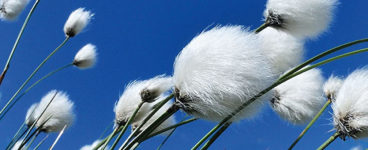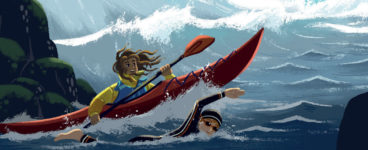‘I think in general culture hasn’t fully reckoned with the climate crisis yet – both in real life as an industry that is contributing to the crisis, and as a means of telling stories.’
404 Ink’s Inkling series of pocket non-fiction books cover a range of brilliant subjects with fun and insight. The latest in the series takes a look at how popular culture and the apocalypse intersect.
The End: Surviving the World Through Imagined Disasters
By Katie Goh
Published by 404 Ink
The End explores our obsession with the end of the world in culture. What sparked your own interest in the end of the world, and the apocalypse as a concept?
Since I was a kid, I’ve been obsessed with the apocalypse. I used to have this recurring nightmare as a child where I would step on a crack in the pavement and set off a nuclear explosion, so I’ve always had quite an apocalyptic mindset and been worried about my own complicity with the end of the world. I grew up as a teenager in the 2000s, when the end of the world seemed to be everywhere, from pop culture, to politics, to economics, to technology, to the climate crisis. I think growing up in that specific context has also made apocalyptic doomsaying part of my everyday life and cultural awareness.
What drew you to write about the topic in more depth?
I first wrote about my – and society’s – obsession with the apocalypse for The Skinny magazine in January 2020. Then, a few months later, it felt like the end of the world actually did happen with COVID and lockdown. People were talking about the pandemic like it was a movie, and so many people (myself included) turned to art for answers, like the film Contagion or the book Severance. I thought that was fascinating: why are we turning to fictional disasters at a time of real disaster? Surely we would want more utopian escapism?
When 404 Ink did their callout for the book pitches, I thought the COVID context could be a really fascinating jumping off point to explore the relationship between fictional and real disasters which has existed long before this specific pandemic.
Why do you think we – as individuals, and society – are drawn to the end of the world?
At the most basic level, we’re human. We want to survive, and when the world is looking more and more apocalyptic, I think we want to hypothesize about our species’ survival. The end of the world is always actually about the start of a new world, and every single post-apocalyptic story, from The Bible’s Book of Revelation to Station Eleven, features survivors as their main characters. I think as our world, right now, feels increasingly unbearable, there’s an apocalyptic desire to say ‘game over, let’s start fresh.’
What does that offer viewers and readers?
I think it gives us perspective. The best apocalyptic and disaster stories take what’s happening right now and places it in a new context. For example, Squid Game is about the personal debt crisis in South Korea, as well as capitalism, reality television and individualism, but the TV show distills all these ideas into a dystopian ‘what if’ scenario. Having that distance, we’re able to explore these big political, economical and social ideas through characters, plot and theme, and I think that helps us to think about our own world with more clarity.
What is your favourite kind of fictional disaster and why?
I’m a big fan of the asteroid disaster. I think it’s the cruellest disaster scenario because, unlike other types of disasters, it’s not usually man-made and there’s nothing you can do about it (unless you’re Bruce Willis). I think that nihilistic apocalypse allows storytellers to really get at human nature: what are people really like when they have no plan b? I also think asteroid disasters are incredible metaphors. In the book, I explore Lars von Trier’s film, Melancholia, which is a disaster movie about depression. I don’t think a disaster is ever really just a disaster in art, usually it’s representing something else and I love that von Trier makes the end of the world feel intensely intimate and personal.
How did the topic evolve as the world faced a pandemic?
The idea for The End definitely crystallized with COVID, but I didn’t want to just write a book about COVID that would age badly. Instead the pandemic gives the reader a way in to think about disasters and grounds the book in real life to explore more existential ideas, like why are we so obsessed with imagining the death of humanity? I definitely think COVID has made people think more about social inequalities and injustice as the pandemic exacerbated the huge gap between the rich and the poor across the globe. That’s something I was especially interested in exploring in the book, particularly looking at dystopian fiction that similarly uses a crisis to uncover social inequalities that are so often normalized.
You write in depth about the climate crisis in regards to the end of the world – how do you think culture does in addressing the crisis through an apocalyptic lens?
I think in general culture hasn’t fully reckoned with the climate crisis yet – both in real life as an industry that is contributing to the crisis, and as a means of telling stories. You have big Hollywood movies like San Andreas, Geostorm and superhero movies which use imagery that we’ve come to associate with the climate crisis (earthquakes, ice shelves crashing into the sea, faminine, masses of climate refugees), but that imagery is severed from the reality of the climate crisis. It’s used to invoke the fear and anxiety that’s associated with the crisis, but without the real world consequences. I think it’s unfair to totally put the blame on filmmakers, but I think there needs to be a reckoning with how these blockbuster movies are creating a sense of passivity around disaster through numbing audiences to climate crisis imagery.
However, I think there are increasingly more storytellers who are interested, not in recreating the climate crisis on screen, but in exploring the complicated emotions around the crisis. For example, Annihilation is a film and book very much about climate grief but explored through personal grief and a strange, uncanny landscape.
You note that climate as a disaster is so large that films, for example, often struggle to capture the gravity of it. What would be your top reads and watches that do something interesting in regards to climate?
Annihilation is definitely one. And Jeff VanderMeer’s novels, generally, are incredible post-apocalyptic stories about our relationship to the environment. I think novels are really becoming the realm of nuanced fiction about the climate crisis. I would recommend Lydia Millet’s A Children’s Bible, Jenny Offil’s Weather, Margaret Atwood’s MaddAddam trilogy and Jessie Greengrass’s The High House. There are hundreds of non-fiction books about the climate crisis, but I think fiction can really explore the emotions of living through this crisis – which can be as powerful as fact.
I’m a bit skeptical of climate crisis documentaries which I think can sometimes do more harm than good at numbing people to the horrors of the crisis, but a recent film I found fascinating was A Living Proof by the Scottish filmmaker Emily Munro. Comprising archive footage, the film looks at Scotland’s relationship to the environment across decades and it really highlights how circular our conversations around the climate crisis have been over time.
What are your top tier apocalyptic recommendations? (Books, films, TV, etc)
I’ll pick a recommendation from the four chapters of The End: for a pandemic disaster, the novel Severance which explores globalisation and capitalism through the zombie apocalypse; for a climate disaster, The Day After Tomorrow because I love that silly movie and I think it really did make people sit up about climate change when it was released; for an extraterrestrial disaster, Arrival (or the short story the movie is based on: Story of Your Life by Ted Chiang), which is about aliens and determinism; and for a social disaster, The Parable of the Sower which is one of the most powerful (and hopeful) dystopian novels I’ve ever read.
The End: Surviving the World Through Imagined Disasters by Katie Goh is published by 404 Ink, priced £7.50
ALSO IN THIS ISSUE

 The Peatlands of Britain and Ireland
The Peatlands of Britain and Ireland
‘We are now beginning to understand the full costly consequences to society of our peatland legacy. …

 Secrets of the Last Merfolk
Secrets of the Last Merfolk
‘‘When we merfolk realised we could live forever, we wondered what we should do with our time. We ch …












